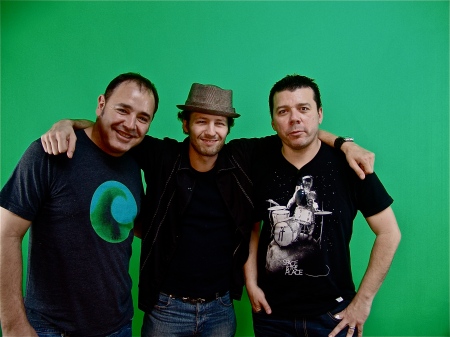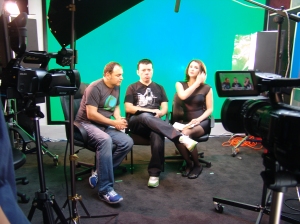So once upon a time, and even long ago, I was going on a mini-journey of self-discovery up in the mountains. I had taken the time to purify my body and take a break from drinking and partying as I was prone to do in my early 20s because, well… I was in my early 20s. I was staying at the home of some friends who could be considered esoteric spiritual new age hippies. Because they were. I very much loved and appreciated these particular esoteric spiritual new age hippies greatly, because they were the perfect foil for my generally skeptical and non-hippie mindset at the time. We had incredibly compelling conversations, rich in thought and intoxicating in philosophical musings. They frequently caused me to question and examine things in ways I don’t think I would have tried to on my own. I loved them, even though I was stone fucking sober.
One day, they had finished reading an interesting book called “Zen and the Art of Motorcycle Maintenance.” Discussion of its contents, extrapolations of its principles and themes lead to the idea that anything could be a metaphor for life. And so they decided to go around asking their friends to ponder a two-fold challenge: 1) identify a preferred activity that brings you inner peace and 2) describe how that activity is a metaphor for life.

Here is another photo that I don’t own the rights to, but I’ve appropriated it for illustrative purposes anyway.
In my case, Jiu Jitsu brings me peace. For those who maybe don’t know and are too lazy to look it up, Jiu Jitsu is a martial art that focuses on grappling, e.g. fighting with holds and pins instead of punches and kicks. There is no striking in Jiu Jitsu. The idea is to get your opponent on the ground, maintain a dominant position and get your opponent to tap out, or submit, by using a method such as a choke or a joint lock. It’s a very technical sport that engages the brain as much as the body. I feel that I am a better and more relaxed person when I practice it. So naturally they posed the question to me: “How is Jiu Jitsu a metaphor for life?”
This was over a decade ago, and even though I am satisfied with my answers, it is still a thought process I play around with to this day, in terms of Jiu Jitsu as well as other activities. How is maintaining a garden a metaphor for life? How is writing programming code a metaphor for life? How about making music, or art, or love? In any of these things, I can find metaphors for life, as I’m sure you can as well, dear reader. As humans, our minds like to connect things, draw parallels between things, and liken things to other things. But the Jiu Jitsu metaphor always sticks with me.
Truly, the possible parallels that can be drawn are limitless, but here are my core thoughts on the topic:
Life has inherent to it a series of problems, but each problem has a solution, even if the solution is not always readily apparent. But with some solutions come more problems. In Jiu Jitsu, every move has a counter move. And each counter move has a counter-counter move.
In life, you will be faced with challenges and obstacles time and time again, but ultimately it is in how you choose to react that helps shape and define your true character. In Jiu Jitsu, whether you win or lose, it’s your attitude and how you choose to react to your victories and losses that define your character. Do you sulk and get angry about your loss? Or do you handle yourself with dignity and decide to learn from the loss so you can become better?
That’s the other thing, with Jiu Jitsu, after a loss your life isn’t over. Your life goes on and you can choose to learn from the loss, get back in the gym and train. You can get angry about it if that anger will motivate you, sure. I know some people who need that fire to compete. I’m more laid back. I’ll get frustrated but I’ll get over it pretty quickly and just learn from the mistake so I can win next time. Whatever emotional state works to motivate you. Like I said, some people need to be pissed off in order to get motivated. In life, when you get knocked down, even to hit rock bottom, you don’t just give up. Your life is still going on around you. Instead, you learn from it. You grow stronger from it. You can get angry about it if it will help motivate you to fix your life, sure. I find the best motivation generally comes from love though instead of Anger. I love having a life, and I love my family and my lifestyle, so that motivates me to work hard to sustain that. I’m not angry or trying to prove anything. But some people find motivation from different emotional states, and that’s fine.

for illustrative purposes, Wanderlei Silva is shown here with Shogun Rua, being decidedly not gay at Jiu Jitsu.
To many people, Jiu Jitsu looks gay. Straight up homoerotic. I love Jiu Jitsu but there is no disguising this fact. When people who don’t know or understand the sport see two sweaty grown men rolling around on the ground, and the observer is unaware of the intricacies of the sport, then, well, it looks like two grown men just rolling around on the ground, trying to mount each other. But the fact is, those two grown men are building their bodies and their minds through an effective martial art system. They’re effectively bettering themselves, and most likely they can submit you. So the parallel I draw for life is that sometimes, you’re going to look totally ridiculous and that’s ok. Learn humility, and to not care about how others perceive you, especially if they have no clue what’s going on. Put thoughts of judgment out of your head (of others and of yourself) and just do what you need to do to improve yourself. This is true of Jiu Jitsu and of life.
In life, you get back what you put into it. If you work hard and dedicate yourself to what you believe in, life will reward you for it. Put your effort into your family, your art, your work, your passion, and you gain from it. So to is Jiu Jitsu. You get out of it what you put into it. People who train harder and train more consistently are more likely to win. Even in winning and attaining colored belts, you are still a student. And so to is life. You are always in a constant state of learning. At least, ideally, you should be. I will always be a student of Jiu Jitsu and of life.
In Jiu Jitsu, I find that I can learn from everybody, regardless of skill level. Training with someone newer may allow me to refine a technique, or re-examine some of the basic principles. Rolling with somebody more experienced will force me to push myself. In life, you can learn a wide variety of things from the people around you, whether it’s kindness, or an example of how not to behave, or anything at all. When we humble ourselves and open our minds to infinite possibility, we empower ourselves to become better, at Jiu Jitsu and at Life.
Life is full of chances, and is shaped in part by the chances you do and don’t take. For example, in Jiu Jitsu I tend to favor a pretty conservative game, meaning I don’t shoot for submissions that often. Though I will often test the proverbial waters by setting up for various submissions. The reality is I am too afraid of losing my position if I shoot for a submission and fail. In that instance, I potentially risk losing control of the match, which I’m sort of against. Getting dominant position in of itself is a battle, why give it up? So oft times I like to sit in the side control position and set up for various submissions without fully committing to them.
I’m sure you already see the life metaphor there without me spelling it out for you, but I’m going to anyways: in life, we oft time hold on to secure, familiar positions without fully committing to something more decisive because of the risk of failure. Sure, you will fail many times in your endeavors, but that’s the method to achieving your loftiest of goals, whether they entail traveling the world, climbing a mountain, excelling at your sport, making great art, starting a revolutionary new business, curing a disease or even just building an evil headquarters surrounded by an impenetrable labyrinth of doom. You simply must get used to taking risks to attain your loftier goals.

Finally, a picture that’s not stolen that I do have rights to. Me, after my first no gi tournament. I tool silver in my division and gold in open division. I only won one match by submission, all the others by points. My goal is to win more matches by submission.
I’ve been forcing myself to start taking more risks in terms of committing to more submission attempts in Jiu Jitsu, and while the gambit sometimes results in a compromised position, you are more likely to get a submission if you shoot for one. Plus, whether I can hit the submission or if my opponent successfully defends, I still gain the benefit of experience, so that come time for a competition, I will be all the more prepared.
And so it is in life. If I work hard enough and I am willing to take risks instead of playing safe in all that I do, I may yet have that villainous lair with corresponding labyrinth of doom…
So yes. There is a multitude of ways in which Jiu Jitsu is an apt metaphor for life.
What is your metaphor for life?














